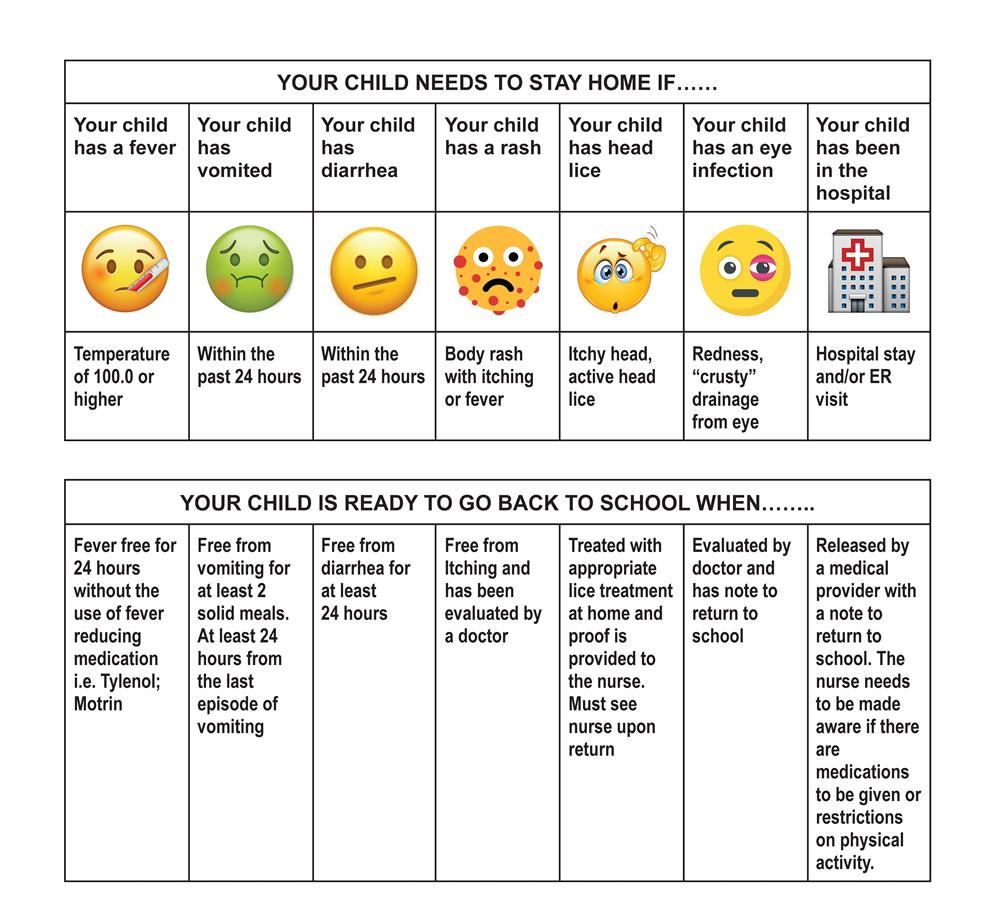- Rilke Schule German Charter School of Arts & Sciences
- When To Stay Home From School
-

Although we stress the importance of good attendance, a student who appears ill should remain at home. Please do not send a student to school to be examined by the school nurse. This exposes students and staff to unnecessary illness. (If you have concerns about your student's health & wish them to be examined, please take them to their primary care provider.) Please notify the front office with any changes to phone numbers, so we will be able to contact you quickly in case of illness or emergency. Accidental injuries at school will be given first aid by the school nurse. In emergencies or in serious accidental injury the parents/guardians will be notified and advised if further medical care is needed.
Below you will find guidance from ASD Healthcare Services for when to keep your child home from school and when it’s okay to send them to school.
· Fever – A fever is a warning that the body is fighting an infection that could easily spread to others. A child with a temperature of 100.4 F should not be sent to school; your child should stay home until they are fever free without the use of fever-reducing medications, like Tylenol.
· Colds – Colds are more difficult to assess. A slightly runny nose and occasional dry cough is not enough to keep your child home. However, if your child’s nose runs constantly and/or the cough is frequent and wet, or your child is experiencing nausea or is too tired and uncomfortable to function at school it would be best to keep the child home for a day or two.
· Cough – If your child has a severe cough, rapid and/or difficulty breathing, wheezing, or the cough is accompanied by a sore throat or not feeling well, the child should stay home from school.
· Diarrhea – Diarrhea is defined as an unusual amount of very liquid stools compared to the child’s normal pattern. Children should stay home until able to participate normally at school.
· Ears – If your child has pain, swelling, drainage or difficulty hearing, please see your healthcare provider. Untreated ear infections can cause temporary or permanent hearing loss.
· Eyes – If your child has red, itchy eyes with a clear, yellow or green drainage from the eye, it may be contagious and a sign of bacterial conjunctivitis (pinkeye). A child with pinkeye can attend school as long as they are able to keep from touching their eyes and show that they can properly wash hands after contact with the infected eye.
· Rash – A rash might be the first sign of an illness. If your child has a rash with a fever and behavioral changes, or a rash that is oozing/open wound, or is tender with the rash worsening, your child should be evaluated by a healthcare provider.
· Sore Throat – If your child has a sore throat, have the child gargle with warm salt water. If child behavior is normal and the child ate breakfast, it’s probably safe to send your child to school. If your child has difficulty swallowing, or you notice saliva building up in your child’s mouth because your child can’t swallow, please keep your child home. If you notice white spots in the back of the throat, please contact your doctor as this could be a sign of an infection.
· Vomiting / Nausea – Please keep your child home if your child has vomited more than 2 times in 24 hours, has a fever or if they look or act ill.
For the link to the ASD Healthcare Services recommendation on when to stay home, please see the link below: /Page/6622
